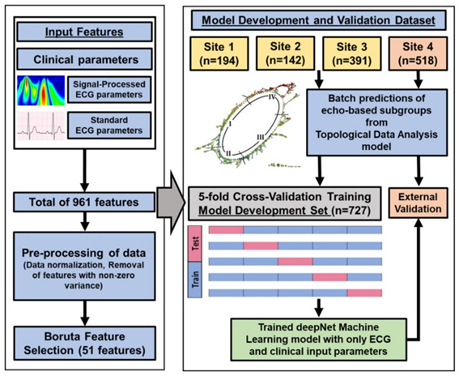

Steps used to develop a machine learning model to extract heart features from electrocardiography results
Invention Summary:
Echocardiography (echo) uses high-frequency sound waves to create images of the heart and show its size, shape, and function. It is a valuable tool for detecting blood clots, tumors, structural defects, muscle performance, and heart size, among others, for men, women, and children. Moreover, there are no side effects, and it is a painless procedure. Due to the COVID-19 pandemic, new advances in telemedicine for cardiology, specifically, tele-echocardiography, are entering the market. Additionally, point-of-care ultrasound for cardiology is spreading, which is also enhanced by these trends in tele-echocardiography. However, despite these advances, echocardiograms still require in-person patient visits to a clinic to receive an ultrasound to generate the echo.
Researchers at Rutgers University have developed an advanced tele-echocardiogram platform that enables an electrocardiogram (ECG) to be performed to synthesize heart images, along with acquiring other vital signs by the patient via a smartphone, without going to a clinic. The technology combines artificial intelligence, mobile health technologies, and cardiology to enable the acquisition of images of the patient's heart and function.
Market Applications:
- An integrated assessment of heart function using clinical and electrocardiographic (ECG) features to replace echocardiographic analysis
- Use cases include identifying patient phenogroups at risk for major adverse cardiac events
Advantages:
- Can extract similar depth of data from ECG data than would traditionally require echocardiograms without requiring a patient to go to a clinic
- Refined ECG-based risk stratification can provide a cost-effective strategy for classifying patients
Intellectual Property & Development Status: Patent pending. Software available for licensing and/or research collaboration. For any business development and other collaborative partnerships contact: marketingbd@research.rutgers.edu